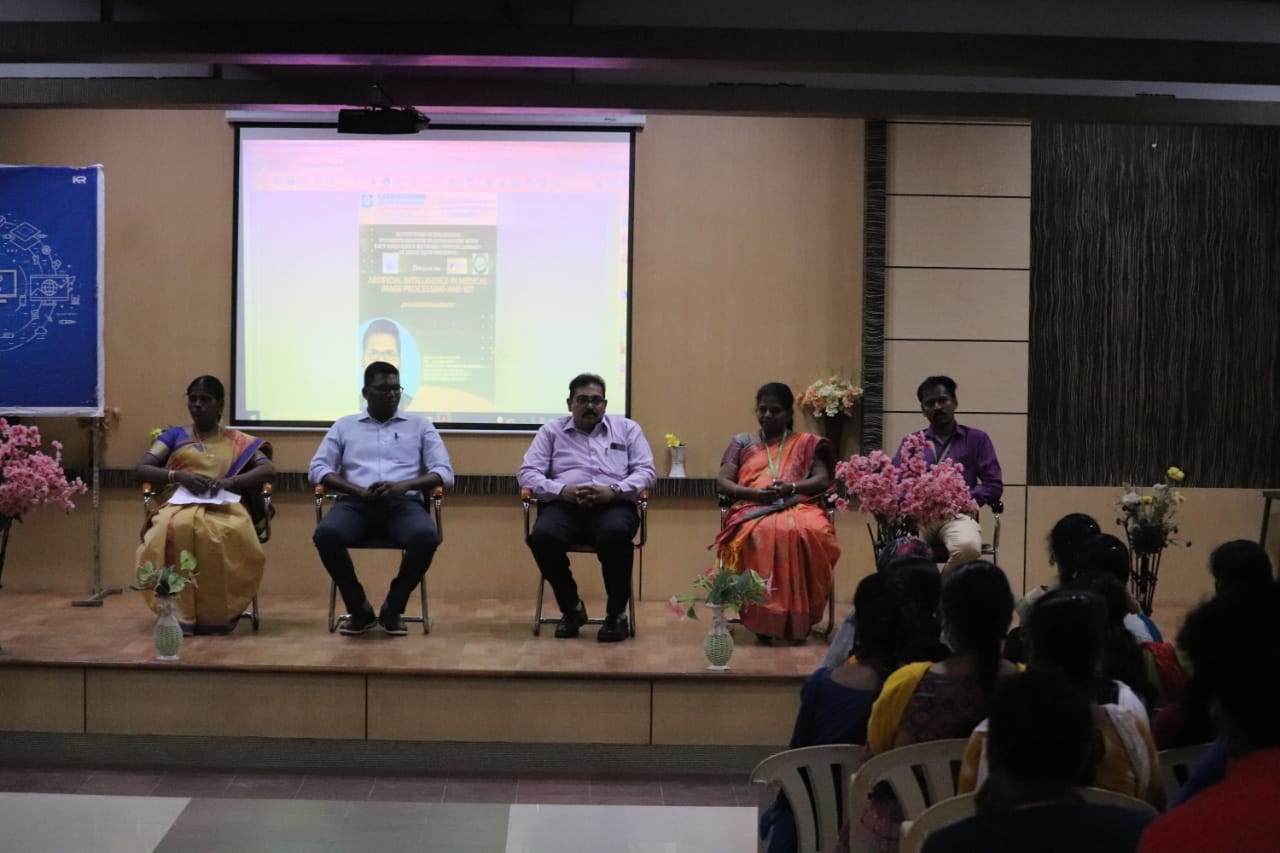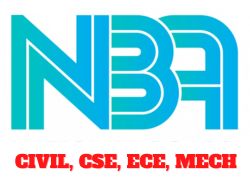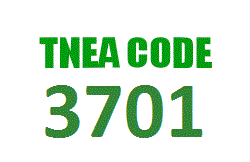
(NBA Accredited)
About Department
The Department of Electronics and Communication Engineering was established in the year 2010 with key motif of success to the students in achieving their goal. The Department has well-equipped Laboratories and Research Laboratories with licensed software’s and also the faculties motivate and encourage their students in upgrading their skills through, motivating students to take active participation in Hackathons, Industrial Visits and In-plant training Programmes. The Department follows enhanced teaching aids like OHP, LCD , Smart Board projectors and e-Learning which help the students to visualize the concepts clearly in an easily and understandable manner.
Courses Offered
B.E. - Electronics and Communication Engineering - 4 Years - Full Time
M.E. - VLSI Design - 2 Years - Full Time
Ph.D. Information and Communication Engineering (ECE) –Part-Time/Full Time
VISION OF DEPARTMENT:
To create innovative and socially responsible Electronics and Communication Engineers with design skills and research focus to meet Societal and Industrial needs.
MISSION OF DEPARTMENT:
M1: To provide high quality education and professional ethics to students through enhanced learning environment
M2: To impart a creative environment towards centre of excellence in department with design skill and exposure for research.
M3: To nurture required employable skills of students to satisfy the industry and social needs with ethical and human values.
PROGRAM EDUCATIONAL OBJECTIVES:
PEO1 : Core Knowledge Development: Graduates will have enhanced engineering skills in the field of electronics, communication and interdisciplinary areas to serve the society with global standards.
PEO2 : Professional development: Graduates will apply the technical knowledge for continuous up gradation of their professional skills to become an inimitable employee, researcher or entrepreneur.
PEO3 : Analytical Thinking: Graduates will have analytic and thinking skills to provide the innovative solutions for industry and societal requirements.
PROGRAM OUTCOMES:
Engineering Graduates will be able to:
PO1 Engineering knowledge: Apply the knowledge of mathematics, science, engineering fundamentals and an engineering specialization to the solution of complex engineering problems.
PO2 Problem analysis: Identify, formulate, review research literature and analyze complex engineering problems reaching substantiated conclusions using first principles of mathematics, natural sciences and engineering sciences.
PO3 Design/development of solutions: Design solutions for complex engineering problems and design system components or processes that meet the specified needs with appropriate consideration for the public health & safety and the cultural, societal and environmental considerations.
PO4 Conduct investigations of complex problems: Use research-based knowledge and research methods including design of experiments, analysis & interpretation of data and synthesis of the information to provide valid conclusions.
PO5 Modern tool usage: Create, select and apply appropriate techniques, resources and modern engineering & IT tools including prediction and modeling to complex engineering activities with an understanding of the limitations.
PO6 The engineer and society: Apply reasoning informed by the contextual knowledge to assess societal, health, safety, legal & cultural issues and the consequent responsibilities relevant to the professional engineering practice.
PO7 Environment and sustainability: Understand the impact of the professional engineering solutions in societal and environmental contexts, and demonstrate the knowledge of and need for sustainable development.
PO8 Ethics: Apply ethical principles and commit to professional ethics and responsibilities and norms of the engineering practice.
PO9 Individual and team work: Function effectively as an individual and as a member or leader in diverse teams and in multidisciplinary settings.
PO10 Communication: Communicate effectively on complex engineering activities with the engineering community and with society at large, such as, being able to comprehend and write effective reports and design documentation, make effective presentations and give and receive clear instructions.
PO11 Project management and finance: Demonstrate knowledge and understanding of the engineering and management principles and apply these to one‘s own work as a member and leader in a team to manage projects and in multidisciplinary environments.
PO12 Life-long learning: Recognize the need for and have the preparation and ability to engage in independent and life-long learning in the broadest context of technological change.
PROGRAM SPECIFIC OUTCOMES (PSOs)
PSO1 To analyze, design and develop solutions by applying foundational concepts of electronics and communication engineering.
PSO2 To apply design principles and best practices for developing quality products for scientific and business applications.
PSO3 To adapt to emerging information and communication technologies (ICT) to innovate ideas and solutions to existing/novel problems.
| S.No | Name of the Faculty | Qualification | Date of Joining in this Institution | Present Designation | Nature of Association (Regular/ Contract/ Ad hoc) If contractual mention |
| 1 | Dr.VASUDEVAN N | M.Tech.,PhD | 17.08.2021 | Professor & Principal | Regular |
| 2 | Dr.SUGANTHI S | M.E., Ph.D | 18.06.2015 | Professor & Centre Head Ranking and Accreditation |
Regular |
| 3 | Dr.KAVITHA A | M.Tech.,PhD | 19.06.2017 | Professor & Head Centre for Student Welfare |
Regular |
| 4 | Dr.KAVITHA M | M.Tech.,PhD | 12.06.2018 | Professor & Library Professor Incharge |
Regular |
| 5 | Dr.PUNITHA A | M.E., Ph.D | 14.08.2024 | Professor | Regular |
| 6 | Dr.RAJINIKANTH C | M.E., Ph.D | 02.12.2024 | Associate Professor | Regular |
| 7 | Dr.SYEDAKBAR S | M.E., Ph.D | 01.06.2011 | Assistant Professor & Head of Department | Regular |
| 8 | Dr.ASHOKRAJ M | M.E., Ph.D | 18.07.2022 | Assistant Professor | Regular |
| 9 | Dr.MONISHA S | M.E., Ph.D | 19.07.2024 | Assistant Professor | Regular |
| 10 | Mr.MANJUNATHAN A | M.E., (Ph.D) | 01.08.2013 | Assistant Professor & Assistant Head of Department | Regular |
| 11 | Mrs.NITHYA S | M.E., (Ph.D) | 25.06.2014 | Assistant Professor | Regular |
| 12 | Mrs.DEEPA J | M.Tech.,(PhD) | 03.06.2015 | Assistant Professor | Regular |
| 13 | Ms.GEERTHANA S | M.E., (Ph.D) | 08.06.2015 | Assistant Professor | Regular |
| 14 | Mrs.GAYATHRI S | M.E. | 20.06.2016 | Assistant Professor | Regular |
| 15 | Mr.MANI P | M.E., (Ph.D) | 03.06.2019 | Assistant Professor & Assistant Head of Department | Regular |
| 16 | Mrs.KARPOORA SUNDARI K | M.E., (Ph.D) | 15.07.2019 | Assistant Professor | Regular |
| 17 | Mrs.INDUMATHI R | M.E., (Ph.D) | 15.07.2019 | Assistant Professor | Regular |
| 18 | Mrs.BHAVANI R | M.E., (Ph.D) | 06.07.2020 | Assistant Professor | Regular |
| 19 | Mr.PARTHIBARAJ A | M.E., (Ph.D) | 02.12.2020 | Assistant Professor | Regular |
| 20 | Mr.RAJA M | M.E., (Ph.D) | 01.06.2022 | Assistant Professor | Regular |
| 21 | Mrs.SANGEETHA K | M.E., (Ph.D) | 03.06.2022 | Assistant Professor | Regular |
| 22 | Mrs.REVATHI G | M.E., (Ph.D) | 19.09.2022 | Assistant Professor | Regular |
| 23 | Ms.NISHANTHI G | M.E. | 03.07.2023 | Assistant Professor | Regular |
| 24 | Mrs.SUDHA P | M.E., (Ph.D) | 01.02.2024 | Assistant Professor | Regular |
| 25 | Mrs. KEERTHANA G | M.E. | 01.02.2024 | Assistant Professor | Regular |
| 26 | Mrs. GOWRI P | M.E., (Ph.D) | 19.07.2024 | Assistant Professor | Regular |
| 27 | Mrs. JAYA RATNAM P | M.E., (Ph.D) | 19.07.2024 | Assistant Professor | Regular |
OBJECTIVE
MOU has been signed to provide a framework of cooperation and understanding, and to facilitate collaboration between the parties to further their shared goals and objectives intensifying mutual benefit for a sustainable development.
|
SLNO |
COMPANY NAME |
DATE OF MOU APPROVAL |
VALIDITY |
|
1. |
INTEL CORPORATION |
29/12/2015 |
29/12/2018 |
|
2. |
VI MICRO SYSTEMS |
18/03/2016 |
Life-time |
|
3. |
RAACTS TECHNOLOGIES |
23/08/2016 |
23/08/2018 |
|
4. |
M/C PROSOL INSTRUMENTS |
14/12/2016 |
Life-time |
|
5. |
TESLA MINDS |
29/09/2018 |
29/09/2020 |
|
6. |
LIFT INDIA INDUSTRIAL TRAINING CENTRE |
18/02/2019 |
18/02/2022 |
|
7. |
SIEMENS CENTRE EXCELLENCE IN MANUFACTORY - NITT |
18/10/2019 |
18/10/2022 |
|
8. |
HILL FE AI |
21/03/2011 |
Life-time |
|
9. |
HITAKEY INFOSYS |
24/11/2021 |
Life-time |
|
10. |
PANTEC SOLUTION PVT LTD |
01/04/2022 |
Life-time |
|
11. |
RAJAN ROBOTICS |
13/05/2022 |
31/05/2027 |
|
S.NO |
Name |
COURSE |
YEAR |
CGPA |
Rank |
|
1 |
K.SOUNDARYA |
B.E - ECE |
2014 |
8.59 |
22 |
|
2 |
P.PADMAVATHI |
M.E - EST |
2015 |
8.97 |
7 |
|
3. |
P.DIVYA |
M.E - EST |
2015 |
8.91 |
10 |
|
4. |
C.BHUVANESHWARI |
M.E - EST |
2015 |
8.77 |
17 |
|
5. |
I.MANJU SREE |
M.E - EST |
2015 |
8.74 |
19 |
|
6. |
R.KALARANJANI |
M.E - EST |
2015 |
8.55 |
31 |
|
7. |
R.MAHALAKSHMI |
M.E – VLSI DESIGN |
2015 |
8.79 |
20 |
|
8. |
T.SUMATHI |
M.E – VLSI DESIGN |
2015 |
8.75 |
23 |
|
9 |
E.RAGA SUDHA |
M.E – VLSI DESIGN |
2015 |
8.54 |
37 |
|
10. |
V.KANIMOZHI |
M.E – VLSI DESIGN |
2015 |
8.41 |
46 |
|
11. |
S.RENUKA |
M.E – VLSI DESIGN |
2015 |
8.40 |
47 |
|
12. |
T.RAMALAXMI |
M.E – VLSI DESIGN |
2015 |
8.37 |
49 |
LIST OF INVITIED / GUEST LECTURE
INVITIED / GUEST LECTURE 2021-2022
INVITIED / GUEST LECTURE 2018-2019
INVITIED / GUEST LECTURE 2017-2018
INVITIED / GUEST LECTURE 2016-2017
INVITIED / GUEST LECTURE 2015-2016
INVITIED / GUEST LECTURE 2014-2015
INVITIED / GUEST LECTURE 2013-2014
INVITIED / GUEST LECTURE 2012-2013
Communicative English
Engineering Mathematics - I
Problem Solving and Python Programming
Engineering Graphics
Semester II:
Technical English
Engineering Mathematics - II
Physics for Electronics Engineering
Basic Electrical and Instrumentation Engineering
Circuit Analysis
Semester III:
Linear Algebra and Partial Differential Equations
Fundamentals of Data Structures in C
Digital Electronics
Control Systems Engineering
Semester IV:
Probability and Random Processes
Linear Integrated Circuits
Environmental Science and Engineering
Semester V:
Discrete-Time Signal Processing
Computer Architecture and Organization
Communication Networks
Basic of Biomedical Instrumentation
Semester VI:
Microprocessors and Microcontrollers
Principles of Management
Transmission Lines and RF Systems
Multimedia Compression and Communication
Semester VII:
Optical Communication and Networks
Embedded and Real Time Systems
Electro Magnetic Interference and Compatibility
Semester VIII:
Professional Ethics in Engineering
© Copyright KRCT | All Rights Reserved.




